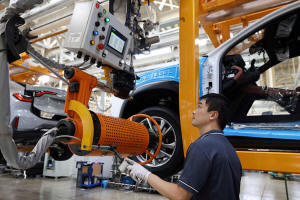China's weak factory PMI raises pressure for consumer stimulus
 Send a link to a friend
Send a link to a friend
 [August 31, 2024] By
Joe Cash [August 31, 2024] By
Joe Cash
BEIJING (Reuters) -China's manufacturing activity sank to a six-month
low in August as factory gate prices tumbled and owners struggled for
orders, an official survey showed on Saturday, pressuring policymakers
to press on with plans to direct more stimulus to households.
The National Bureau of Statistics purchasing managers' index slipped to
49.1 from 49.4 in July, its sixth straight decline and fourth month
below the 50 mark separating growth from contraction. It missed the
median forecast of 49.5 in a Reuters poll.
After a dismal second quarter, the world's second-largest economy lost
momentum further in July, prompting policymakers to signal they were
ready to deviate from their playbook of pouring funds into
infrastructure projects, instead targeting fresh stimulus at households.
Sentiment remains gloomy among manufacturers as a years-long property
crisis keeps domestic demand in the doldrums and Western curbs loom on
Chinese exports such as electric vehicles.
Producers reported factory gate prices were their worst in 14 months,
plunging to 42 from 46.3 in July, while the new orders and new export
orders sub-indices remained firmly in negative territory and
manufacturers maintained a hiring halt.
"The fiscal policy stance remains quite restrictive, which may have
contributed to the weak economic momentum," said Zhiwei Zhang, chief
economist at Pinpoint Asset Management.
"To achieve economic stabilization, the fiscal policy stance needs to
become much more supportive. With the U.S. economy slowing, exports may
not be as reliable a source for growth as it was in the first half of
the year," he added.
Policy advisers are pondering whether Beijing may decide in October to
bring forward part of next year's bond issuance quota if growth does not
show signs of bottoming out in the summer.
China made a similar move at the same time last year with stimulus that
raised the deficit to 3.8% of GDP from 3.0% and frontloaded part of the
2024 local government debt quotas to invest in flood prevention and
other infrastructure.

This time, however, analysts anticipate the authorities will seek to put
a floor under depressed domestic demand.
[to top of second column] |

An employee works on the production line of Nio electric vehicles at
a JAC-NIO manufacturing plant in Hefei, Anhui province, China August
28, 2022. China Daily via REUTERS/File Photo

EARLY ENCOURAGING SIGNS
Retail sales topped forecasts last month, apparently vindicating
officials' July decision to allocate around 150 billion yuan ($21
billion) China is raising through ultra-long treasury bonds this
year towards subsidising a trade-in scheme for consumer goods.
And the August reading of the non-manufacturing PMI, which includes
services and construction, quickened to 50.3 from 50.2, allaying
fears that it would also enter a period of contraction.
Still, economists are waiting on more specific plans to reinvigorate
China's 1.4 billion-strong consumer market beyond a pledge from the
top-decision making body of the ruling Communist Party that it will
do so.
It will not be easy.
"I'm not actually sure if more (stimulus) can be rolled out," said
Xu Tianchen, senior economist at the Economist Intelligence Unit,
given the scale of the trade in scheme, which he said "would provide
moderate support to the economy" and "seems to be welcomed by
consumers".
What is more, any effort to revive domestic demand will likely be
ineffective unless further efforts are taken to alleviate a bruising
slump in the property sector, which has weighed heavy on consumer
spending over the past three years.
With 70% of household wealth held in real estate, which at its peak
accounted for a quarter of the economy, consumers have kept their
wallets tightly shut.
A Reuters poll on Friday forecast home prices will fall 8.5% in
2024, deeper than the 5.0% decline tipped in a May survey.
"I think officials will settle for something lower than 5% this
year," the EIU's Xu said, referring to Beijing's annual growth
target.
(Reporting by Joe Cash; Editing by Himani Sarkar and William
Mallard)
[© 2024 Thomson Reuters. All rights
reserved.]
This material may not be published,
broadcast, rewritten or redistributed.
Thompson Reuters is solely responsible for this content. |